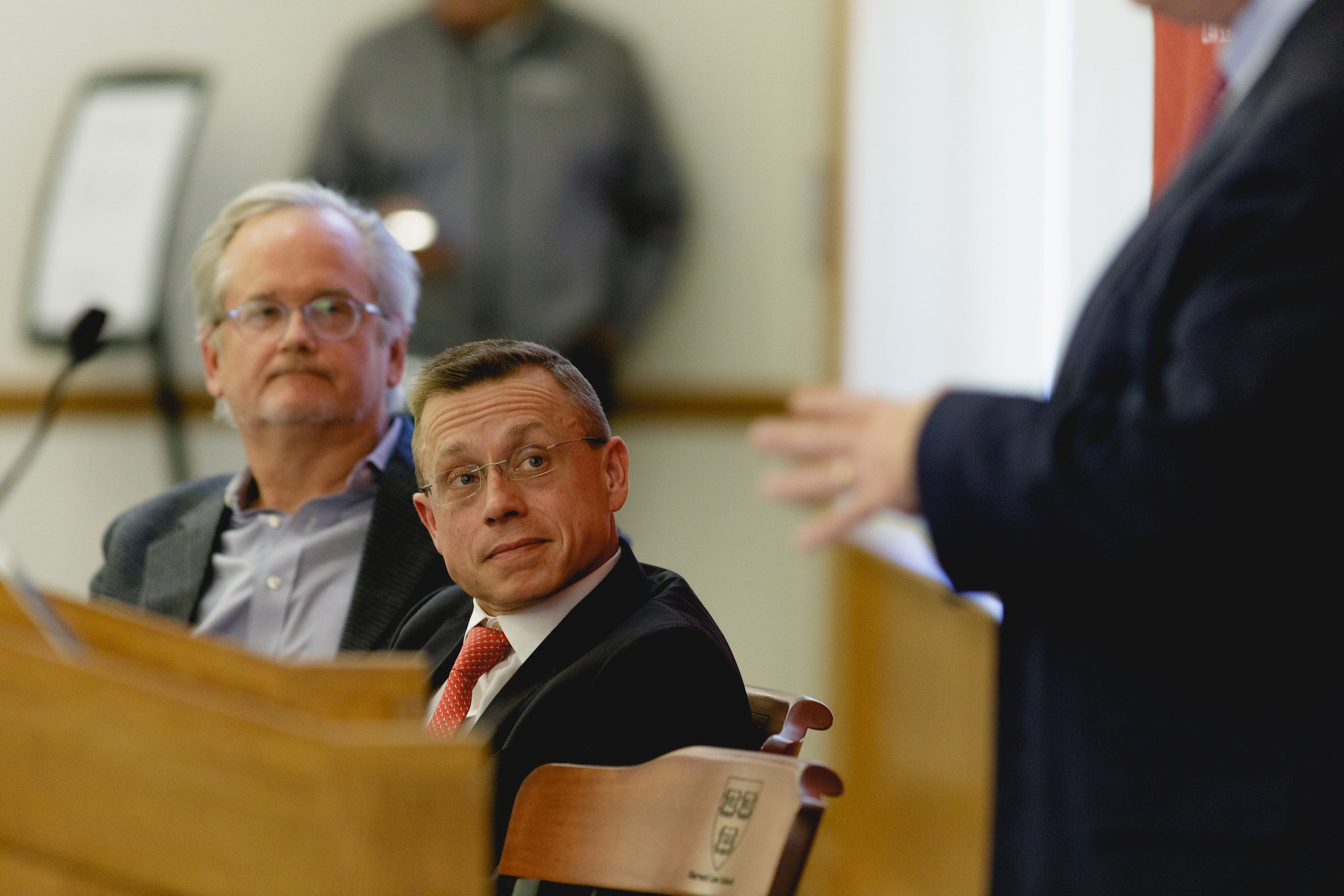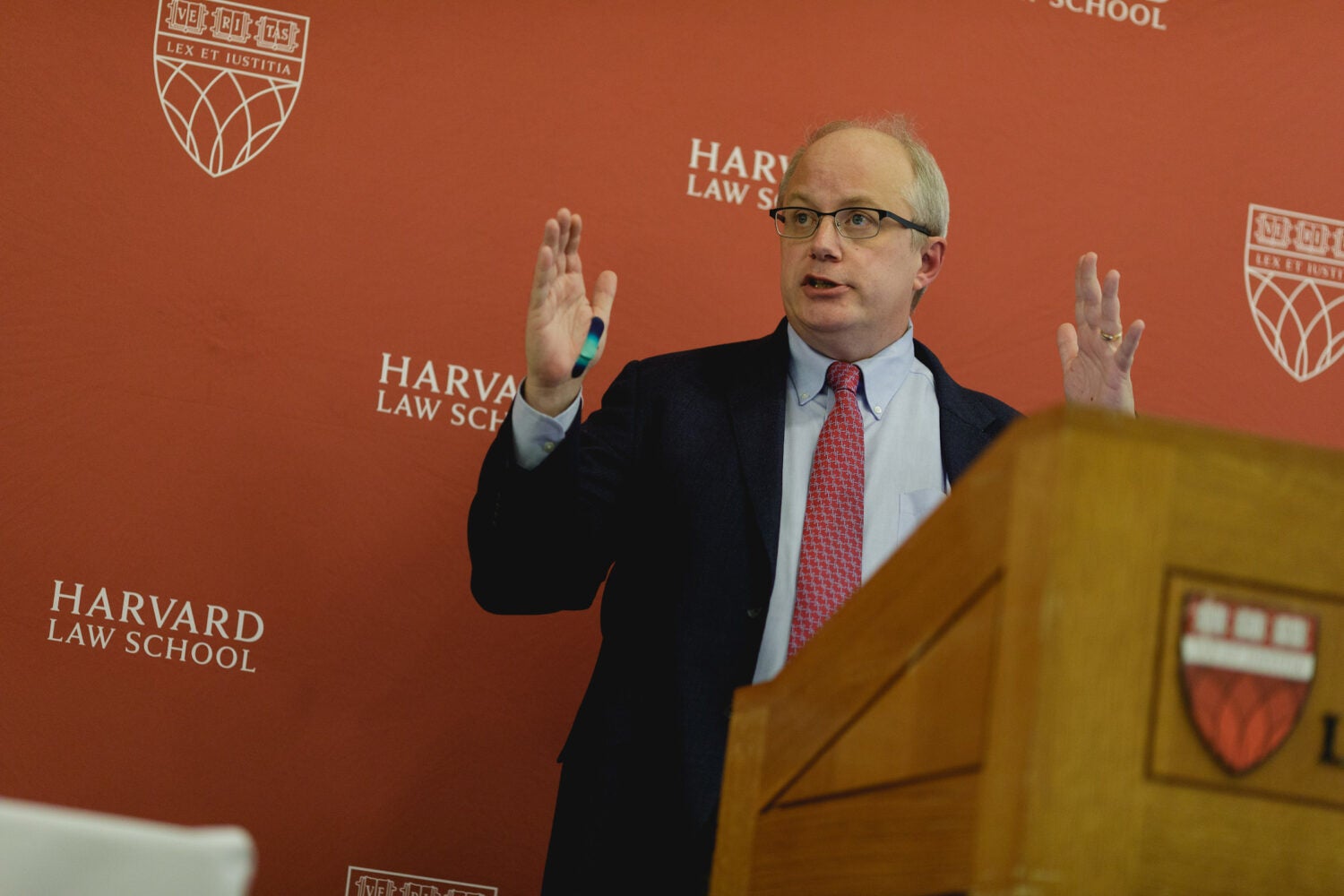Supreme Court Justice Antonin Scalia ’60, who came to be known as originalism’s chief architect, began his career on the bench as a proponent of expansive powers for administrators to interpret and implement laws. In contrast to the fierce opponent of the administrative state that the late justice eventually became, Harvard Law Professor Adrian Vermeule ’93 argues that the “original Scalia” believed federal agencies need wide latitude to ensure that oft-unclear statutes passed by Congress are applied in a way that best supports the “common good.”
In a talk last Wednesday to a standing-room only crowd of students and fellow faculty members at Harvard Law School, Vermeule, the Ralph S. Tyler, Jr. Professor of Constitutional Law, said that the “original Scalia turns out to be remarkably different from the Scalia who emerges towards the end of his career,” whom he called the “evolved Scalia.” He believes that Scalia’s early writings and opinions were more in keeping with the classical legal tradition, as explicated by Aristotle and Thomas Aquinas, than with the type of originalist and textualist approach for which he later became (in)famous.
Scalia’s evolution away from those time-honored methods of interpreting the law and towards a more rigid form of originalism, Vermeule argued, mirrors a similar journey taken by the conservative legal movement in recent years.
“In my view, the transition from original to evolved Scalia is a kind of synecdoche, or summary, of the profound transition in the conservative legal movement over roughly the same period, resulting in American legal conservatism becoming increasingly focused on criticism and limitation of the administrative state,” said Vermeule, who clerked for Scalia after law school.
Vermeule, a constitutional scholar and administrative law expert, used the address to highlight several themes he also outlined in his recent book, “Common Good Constitutionalism,” in which he offered a fundamental critique of today’s leading approaches to constitutional law and interpretation. In that volume, he argued for a return to an approach to law grounded in a classical Western legal tradition stretching back to the Old Testament and running through the Roman Empire, medieval Europe, and the English common law.
In my view, the transition from original to evolved Scalia is a kind of synecdoche, or summary, of the profound transition in the conservative legal movement over roughly the same period, resulting in American legal conservatism becoming increasingly focused on criticism and limitation of the administrative state.
Adrian Vermeule
His address came as part of the Vaughan Academic Program, which was made possible by the generosity of Herbert W. Vaughan LL.B. ’48. The biennial lecture at Harvard Law, which was first delivered in 2008 by Justice Scalia, aims to promote and advance understanding of the founding principles and core doctrines of American constitutionalism. On Wednesday, Vermeule was introduced by Jack Goldsmith, the Learned Hand Professor of Law.
According to Vermeule, this “classical view systematically distinguishes his two different senses of law: lex, the positive written civil law, and ius, general and traditional background principles of law writ large.” Original Scalia, he argued, “expressly tries to distinguish the two senses of law along classical lines.” When the written, or positive, law was unclear, Scalia relied on ius to “fill in” the gaps or, where possible, read the law so as to authorize administrative agencies to do so.
In support of his thesis, Vermeule cited four academic articles and two judicial opinions authored by the late justice in 1988 and 1989, a period he called “a miraculous year in the sphere of law.” In “The Rule of Law as a Law of Rules,” Vermeule explained that Scalia quoted Aristotle’s contention that it is nearly impossible to frame laws that account for every possible contingency, before concluding “I stand with Aristotle, which is a pretty good place to stand.” In Scalia’s article “Judicial Deference to Administrative Interpretations of Law,” Vermeule said that the justice offered a defense of the legal principle of Chevron deference, agreeing that administrative agencies must make adjustments when either general rules or positive law is ambiguous, silent or overly broad.
Vermeule noted that Scalia, in “Assorted Canards of Contemporary Legal Analysis,” offered some “withering criticism of clear statement rules,” under which courts are not supposed to interpret laws to achieve particular policy ends. And in “Originalism: The Lesser Evil,” the professor said Scalia defended originalism, but “principally on public interest grounds very different than those that later became dominant when originalism took what people call a jurisprudential turn to more abstract justification.”
Two standalone judicial opinions Scalia wrote around the same time, Vermeule argued, demonstrate the relatively youthful justice’s efforts to apply the classical distinction between the two different types of law: lex and ius. Vermeule noted that in his lone dissent in Webster v. Doe, which involved a technical question of agency reviewability under the Administrative Procedure Act, Scalia argued that a “fundamental” principle is that all laws must be interpreted to “further a public purpose rather than a purely private interest.” But, Vermeule said, the justice cited no legal provision to justify his opinion.
“What he’s done is simply translate an essential element of the classical view of law that it should be ordered to the common good,” Vermeule explained. This, he said, is probably “the best exposition of ius to appear in the U.S. Reports since World War II,” referring to the published opinions of the Supreme Court.
Similarly, in his partial concurrence in Green v. Bock Laundry, a case focusing on whether the federal rules of evidence permit a civil litigant to attack their opponent’s credibility by citing prior felony convictions, Scalia believed that the court’s majority was correct in allowing such information to be introduced at trial because, among other reasons, “’it was consistent with the policy of the law in general,’” Vermeule said, quoting the justice. This is another example, he explained, of Scalia extrapolating “from very ancient roots a more general policy of the law, without reference to particular positive law.”
But who exactly did the original Scalia believe should apply the underlying principles of law to specific statutes of Congress? The administrative agencies, Vermeule says. “The original Scalia’s view of Chevron [a landmark 1984 Supreme Court decision that created a doctrine of deference to administrative agencies] rests on exactly the kind of benign fiction, based on the overall policy of the law in general, law as ius, that Scalia urged in Bock Laundry. The benign fiction here is that Congress has … authorized agencies to resolve hard cases by filling statutory gaps” by making important policy judgments.

Although Scalia did support a version of the originalism for which he is remembered, Vermeule argues that the justice saw it as the best method for constraining judges from interfering with executive branch decisions. The original Scalia’s aim in arguing for originalism was, the professor said, “to protect and expand executive power.”
“What he cared about was a powerful administrative state headed by a powerful president,” Vermeule argued. Scalia, he said later in the talk, was throughout the 1980s and 1990s, “known as the Court’s champion of Chevron, of the administrative state, and of presidential power.”
By 2013, however, Vermeule argued that Scalia had begun to repudiate some of his earlier views. “We see evolved Scalia becoming increasingly critical of the administrative state and increasingly reliant on, in my view, a simplistic distinction between law and result oriented decision-making that he saw as outside of law. And this is a direct contradiction of his earlier views.”
Vermeule points to a speech Scalia made to a conference of Dominican Friars shortly before the justice’s death in 2016, in which he contradicted the medieval thinker and Dominican Thomas Aquinas, who with Aristotle was one of the leading exponents of the classical legal tradition, saying: “Despite my veneration for St. Thomas Aquinas, I plan to contradict what Thomas Aquinas says about judging. It is necessary to judge by the written law, period.” The broad horizons encompassed by original Scalia’s reliance on general principles of law to foster the common good had been, for the evolved Scalia, narrowed to the width and breadth of the ink spread across the statute books.
Following his address, Vermeule was joined by two panelists who briefly shared their perspectives on his arguments.
What [Scalia] cared about was a powerful administrative state headed by a powerful president.
Adrian Vermeule
Lawrence Lessig, Harvard’s Roy L. Furman Professor of Law and Leadership, questioned whether Vermeule’s efforts to resurrect past methods of legal interpretation would work in today’s deeply skeptical society.
“Adrian’s work asks us to reimagine, so we might practice again, the classical model of law,” Lessig said. But he argued that doing so presupposes a culture that trusts decision-makers to act in the public good.
“I would submit our culture today is not the culture the classical model presumes,” Lessig said. “Whether justified or not, our culture today, our legal culture, is profoundly suspicious. And in our culture today, whenever any court, or from the perspective of the DC Circuit, any agency, acts, we do not presume it acts in the public interest. We instead suspect it acts for a political interest,” thereby rendering efforts by administrators or judges to interpret and adjust the law to conform to the common good “presumptively illegitimate.”
Lessig believes that Scalia sensed this conundrum and therefore reconsidered his views over time to account for it. “I suggest to you that evolved Scalia has simply translated Thomas Aquinas … from a very different legal culture to our own very skeptical people culture.”
U.S. Circuit Judge Andrew Oldham ’05 joked that he had attended Harvard Law School during Scalia’s “Mesozoic period, after the original but before his evolved one.” He argued that several cases that Vermeule had not cited, particularly Mistretta v. United States, shed a different light on original Scalia’s views about executive power. Quoting Scalia’s dissent in the case, in which every justice but him voted to uphold the constitutionality of the U.S. Sentencing Commission, Judge Oldham said that the original Scalia objected to the idea of Congress delegating its powers to an unelected body.
“‘It is difficult to imagine a principle more essential to democratic government than that upon which the doctrine of unconstitutional delegation is founded,’” Oldham quoted Scalia as writing. “Except in a few areas constitutionally committed to the executive branch, the basic policy decisions governing society are to be made by the legislature. … Our members of Congress could not, even if they wish to, vote all power to the president, and adjourn sine die.”
In response, Vermeule said that Judge Oldham had “stopped reading” Scalia’s opinion in the Mistretta case “a bit too soon.”
“The very next paragraph after Judge Oldham stopped reading says, ‘[w]hile the doctrine of unconstitutional delegation is unquestionably a fundamental element of our constitutional system, it’s not an element readily enforceable by the courts,’” he said, paraphrasing Scalia. Thus, he concluded that the “baseline fact in Mistretta is that Scalia joined the Court in completely rejecting the main non-delegation claim,” although Scalia would have recognized a special, far narrower claim.
In response to Lessig, Vermeule observed that recent findings in the burgeoning field of “experimental jurisprudence” have found that widespread natural intuitions about law are suffused with moral standards and identify evil laws as not counting as law at all. Hence, Vermeule suggested, Lessig’s approach rests on an empirical claim that is largely false. Although the legal culture of a few elite law schools may be skeptical in the way Lessig suggests, that is partly because legal academics teach that skepticism to their students. Practicing lawyers and judges, according to Vermeule’s recent book, often draw upon ius to fill gaps in the law, even if they don’t understand they are doing so or acknowledge doing so.
